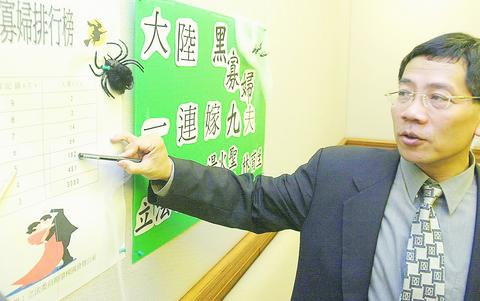Legislators yesterday urged the government to investigate the high rates of remarriage among female immigrants from China, citing an example of two Chinese brides who have each married nine times.
DPP Legislator Chien Chao-tong (
Chien said the motivation of these Chinese brides is suspicious as a large number of them are married to military veterans of the Chinese Civil War and World War II, who came to Taiwan with the KMT government when it retreated to Taiwan after defeat in the Chinese civil war of 1949.

PHOTO: SEAN CHAO, TAIPEI TIMES
"Some of them might be involved in fake marriages. Some of them might be married for the old veterans' money. All these things could possibly happen, as we know that many Chinese `brides' really come to Taiwan to work as prostitutes," Chien said.
Chinese nationals can obtain Taiwan residence permits on the strength of marriage to a Taiwan national.
Chien said the statistics have shown that two Chinese brides topped the number of marriages with nine each, followed by three Chinese brides who have married eight times. Chien also revealed that there are 491 who have married four times and 3,000 who have married three times.
Legislator Tang Huo-shen (湯火聖) yesterday said the main reason behind the high number of marriages by Chinese brides is because of the death of their Taiwanese husbands.
"Nearly 8,000 out of the total 12,000 veterans in Taiwan have married Chinese brides, half of which are under the age of 40," Tang said, adding, "Judging from these figures, we could anticipate a high remarriage ratio of brides."
Citing figures from the Ministry of the Interior, Tang said as of the end of last year, the total number of Chinese brides in Taiwan is about 154,000, with numbers estimated to rise to 400,000 by 2016.
In a reference to an oft-voiced concern about immigration from China -- that large numbers of naturalized immigrants from China could exert a pro-China influence on Taiwan's politics and even jeopardize national security -- he said that such a large number of people "is bound to play a role in the election of the president," so the authorities should attach importance to the matter.

Alain Robert, known as the "French Spider-Man," praised Alex Honnold as exceptionally well-prepared after the US climber completed a free solo ascent of Taipei 101 yesterday. Robert said Honnold's ascent of the 508m-tall skyscraper in just more than one-and-a-half hours without using safety ropes or equipment was a remarkable achievement. "This is my life," he said in an interview conducted in French, adding that he liked the feeling of being "on the edge of danger." The 63-year-old Frenchman climbed Taipei 101 using ropes in December 2004, taking about four hours to reach the top. On a one-to-10 scale of difficulty, Robert said Taipei 101

Nipah virus infection is to be officially listed as a category 5 notifiable infectious disease in Taiwan in March, while clinical treatment guidelines are being formulated, the Centers for Disease Control (CDC) said yesterday. With Nipah infections being reported in other countries and considering its relatively high fatality rate, the centers on Jan. 16 announced that it would be listed as a notifiable infectious disease to bolster the nation’s systematic early warning system and increase public awareness, the CDC said. Bangladesh reported four fatal cases last year in separate districts, with three linked to raw date palm sap consumption, CDC Epidemic Intelligence

US climber Alex Honnold left Taiwan this morning a day after completing a free-solo ascent of Taipei 101, a feat that drew cheers from onlookers and gained widespread international attention. Honnold yesterday scaled the 101-story skyscraper without a rope or safety harness. The climb — the highest urban free-solo ascent ever attempted — took just more than 90 minutes and was streamed live on Netflix. It was covered by major international news outlets including CNN, the New York Times, the Guardian and the Wall Street Journal. As Honnold prepared to leave Taiwan today, he attracted a crowd when he and his wife, Sanni,

Two Taiwanese prosecutors were questioned by Chinese security personnel at their hotel during a trip to China’s Henan Province this month, the Mainland Affairs Council (MAC) said yesterday. The officers had personal information on the prosecutors, including “when they were assigned to their posts, their work locations and job titles,” MAC Deputy Minister and spokesman Liang Wen-chieh (梁文傑) said. On top of asking about their agencies and positions, the officers also questioned the prosecutors about the Cross-Strait Joint Crime-Fighting and Judicial Mutual Assistance Agreement, a pact that serves as the framework for Taiwan-China cooperation on combating crime and providing judicial assistance, Liang